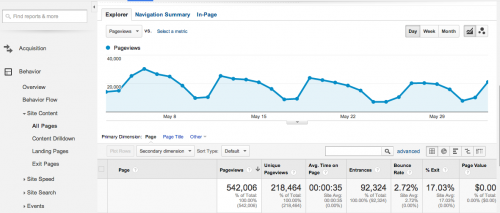Augsburg College uses Google Analytics to track our website traffic. It is a useful tool that does many great things. If you want to use Google Analytics to see information about your website’s traffic, it’s important that you know this one thing:
Google Analytics will give you numbers, but not actionable data.
In other words, Google Analytics tells you how many people visited a page, how they got there, how long they stayed, etc. But it won’t tell you anything you can take action on, like how to improve your site or whether it even needs to be improved.

Like Richard Dreyfuss building a mountain out of mashed potatoes in Close Encounters of the Third Kind, you know your traffic numbers mean something, but you don’t know what that something is.
Questions Google Analytics cannot answer about a web page
- Do people find it useful?
- Do people like it or dislike it?
- Do people know how to get to it?
- Why do we have so few visitors to that page?
- Are our traffic numbers good or bad?
These make sense, if you think about it. Let’s say 100 people visited your website’s home page in the last month. What would you do with that information? Would you decide that is too low and that you need to find ways to drive traffic to your site? If so, how do you know that number is low? And what is a good number?
And let’s say there is one page on your site that you really want people to see, but it is getting a disappointing average of 10-15 visits per month. Would you conclude that because of the low turnout people are not finding this page interesting or useful, and therefore you should remove it? This begs the same questions as before, about how you know whether a number is good, bad, or just right, and it takes an even further leap of logic by assuming that the low numbers are the result of people not finding the page useful. Plus, if you are so willing to remove the page, perhaps this means the page is actually not useful and should be removed. Yet if it is useful or necessary, even to a small portion of people, it should probably stay, and you should not gauge the success of the page by the number of visits.
There are any number of possible causes for a lack of visits. Perhaps they aren’t noticing the page, but perhaps they are noticing it and just aren’t interested in clicking to it. Is the page necessary to do an action, such as registering for an event, or is it a non-action page? People are more likely to go to a page they need to go to in order to complete a task, rather than one you simply hope will be interesting to them. So let’s say you decide that the traffic number is low and you want to raise it by trying various ways of driving traffic to the page. This is a good strategy if the problem is people not knowing about the page or people not knowing that the page is actually useful to them, but this strategy will fail if the problem is a genuine lack of interest or usefulness.
None of this is information you can know by knowing your website’s traffic numbers.
Google Analytics is useful for
- Seeing how many people are visiting your website
Yeah, that’s about all you will get out of it.
At this point you may be asking yourself why we use it at all. Well, everything I have said up until this point refers to the casual Google Analytics user. The truth is that Google Analytics does a lot of great things but only if you dig deep into its features. You can use it to track the impact of various internet marketing campaigns so that you can see which campaign is more effective and divert your advertising money based on that. You can track customer paths through your site to see where they may be getting lost or confused, or use it to track changes on your site to test how well a new approach compared to your old one.
All of those things require a level of sophisticated interaction with Google Analytics that most people outside of a marketing department don’t want to take the time to learn or maintain.
What should you do?
Make the best website you can.
You’re welcome to have access to Google Analytics and look at your traffic numbers, but it’s hard for me to find a good reason why you should. They just won’t give you information you can use. Instead, focus your energy on making a good website:
- Pages formatted and organized for easy scanning
- Clear calls to action
- Removing unnecessary content clutter
- Clear and concise wording
- Clear navigation (menu)
And then, after you think you have a good website, if you have something specific you want to track in Google Analytics, give it a shot.
If you’re interested in reading more about Google Analytics, check out Why Google Analytics
